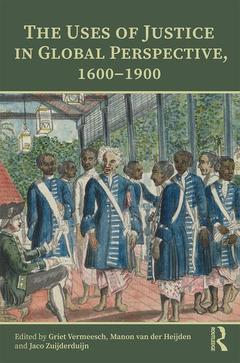The Uses of Justice in Global Perspective, 1600–1900
Coordonnateurs : Vermeesch Griet, van der Heijden Manon, Zuijderduijn Jaco

The Uses of Justice in Global Perspective, 1600?1900 presents a new perspective on the uses of justice between 1600 and 1900 and confronts prevailing Eurocentric historiography in its examination of how people of this period made use of the law.
Between 1600 and 1900 the towns in Western Europe, the Kingdoms in Eastern Europe, the Empires in Asia and the Colonial States in Asia and the Americas were all characterised by a plurality of legal orders resulting from interactions and negotiations between states, institutions, and people with different backgrounds. Through exploring how justice is used within these different areas of the world, this book offers a broad global perspective, but it also adopts a fresh approach through shifting attention away from states and onto how ordinary people lived with and made use of this ?legal pluralism?.
Containing a wealth of extensively contextualised case studies and contributing to debates on socio-legal history, processes of state formation from below, access to justice, and legal pluralism, The Uses of Justice in Global Perspective, 1600?1900 questions to what degree top-down imposed formal institutions were used and how, and to what degree, bottom-up crafted legal systems were crucial in allowing transactions to happen. It is ideal for students and scholars of early modern justice, crime and legal history.
1 The uses of justice in global perspective, 1600–1900 2 The Sinitic justice system, past and present – in a global perspective; 3 Threads of the legal web: Dutch law and everyday colonialism in eighteenth-century Asia; 4 Facing the law in eighteenth-century Galle; 5 Legal pluralism in the cities of the early modern Kingdom of Poland: the jurisdictional conflicts and uses of justice by Armenian merchants; 6 The use and abuse of legal services in nineteenth-century Russia; 7 Skipping court: civil disputes in sixteenth-century Rouen; 8 In hope of agreement: norm and practice in the use of institutes for dispute settlement in late-seventeenth-century Leiden; 9 Justice and the confines of the law in early modern Spain; 10 Lo extrajudicial: between court and community in the Spanish empire; 11 Legal pluralism, hybridization and the uses of everyday criminal law in Quebec, 1760–1867
Griet Vermeesch is a fellow of the Research Foundation Flanders at the Vrije Universiteit Brussels, in Belgium. Her research relates to urban history and to access to justice in the Low Countries during the early modern period.
Manon van der Heijden is Professor of Urban History at Leiden University and a member of the Academia Europaea. She is author of Women and Crime in Early Modern Holland (2016).
Jaco Zuijderduijn is Associate Professor at the Department of Economic History at Lund University, Sweden. His main research interest is the development of economic exchange and conflict resolution. He previously published Medieval Capital Markets: Markets for Renten, State Formation and Private Investment in Holland (1300–1550).
Date de parution : 12-2018
15.6x23.4 cm
Disponible chez l'éditeur (délai d'approvisionnement : 14 jours).
Prix indicatif 73,30 €
Ajouter au panierDate de parution : 12-2018
15.6x23.4 cm
Disponible chez l'éditeur (délai d'approvisionnement : 14 jours).
Prix indicatif 230,48 €
Ajouter au panierThème de The Uses of Justice in Global Perspective, 1600–1900 :
Mots-clés :
Legal Pluralism; Conict Settlement; Rouen; Jurisdictional Conicts; Leiden; Chinese Justice System; Spain; Peacemaker Court; Civil Disputes; Vice Versa; confines of the law; Roman Dutch Law; Legal Services; Armenian Court; abuse; Land Council; Russia; People’s Mediation; Local justice; Informal Justice System; Empire; Armenian Elders; Ottoman; Voc Archive; Macedonia; Magdeburg Law; Kadi Courts; Kingdom of Poland; Armenian Merchants; Armenian; Societal Mediation; merchants; English Criminal Law; Sinitic justice system; Dutch Legal Culture; Galle Landraad; Central District Court; Sri Lanka; Armenian Community; China; Informal Justice; Quebec; Galle District; crinimal justice; Galle Fort; law courts; Notarial Records; abolition; race; Spanish Empire; Latin America



